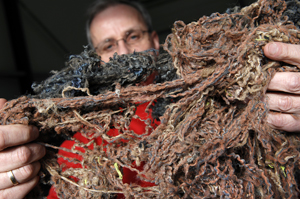
Loop secures $66 million in new funding

Modular flooring manufacturer InterfaceFLOR has signed a pan-European agreement with waste management specialist, SITA. The partners in sustainability have joined forces to recover end-of-life carpet tiles from customers across Europe and maximise their use. Rather than being sent to landfill, the tiles will be returned to InterfaceFLOR to be re-used by the company's social partners or fully recycled in to n

27th October 2011
Innovation in Textiles
|
The Netherlands
 Modular flooring manufacturer InterfaceFLOR has signed a pan-European agreement with waste management specialist, SITA. The partners in sustainability have joined forces to recover end-of-life carpet tiles from customers across Europe and maximise their use.
Modular flooring manufacturer InterfaceFLOR has signed a pan-European agreement with waste management specialist, SITA. The partners in sustainability have joined forces to recover end-of-life carpet tiles from customers across Europe and maximise their use.
Rather than being sent to landfill, the tiles will be returned to InterfaceFLOR to be re-used by the company's social partners or fully recycled in to new carpet tiles using the company's pioneering ReEntry 2.0 technology. According to InterfaceFLOR, in Europe alone, an estimated 30 million square metres of carbon intensive, oil based carpet tiles are sent to landfill or incinerated each year, which it says is both environmentally and financially unsustainable.
"InterfaceFLOR has long campaigned for manufacturers to take responsibility for their products at their end-of-life in order to divert the amount of materials that end up in landfill as waste. The company has offered a take-back scheme for its products since 1995, called ReEntry, which has diverted more than 100,000 tonnes of used carpet from disposal globally," the company said in a statement.
Lindsey Parnell, President and CEO of InterfaceFLOR in Europe, Middle East, Africa and India says: "We are really excited to be scaling up our ReEntry programme with SITA's logistics and recycling expertise. Like us, they see what many classify as waste as a future raw material and a business opportunity. And at a time when commodities are in short supply and costs are spiralling, it is even more important than ever to make maximum use of what we have."
"Our ultimate aim is to close the materials loop, so that our used products become the raw materials for our new products, making us an entirely self-sufficient and sustainable business," Mr Parnell continued. InterfaceFLOR's partnership with SITA will initially operate in The Netherlands, and will be expanded over the next eighteen months to cover more of the EMEAI region.
InterfaceFLOR says the new carpet tile recovery partnership is in line with its Mission Zero goal to eliminate any negative impact it has on the environment by 2020. Since the mid-nineties, the company says it has has made significant progress towards achieving this goal, including an 82% reduction in waste sent to landfill and more than $438 million saved in avoided waste costs.
Currently over 40% of total raw materials for InterfaceFLOR's products are recycled or bio-based. InterfaceFLOR's ReEntry programme: a three-pronged attack on waste InterfaceFLOR's ReEntry scheme provides customers with three options for their used carpet tiles: reuse; recycling through the ReEntry 2.0 process or energy recovery. Many carpet tiles are replaced before they are technically worn, enabling them to be reused in other locations or re-purposed, extending their useful life.
To reuse ReEntry carpet tiles, InterfaceFLOR works in partnership with social enterprises and recycling organisations across Europe. These partnerships offer social benefits to local communities, including employing disadvantaged people, giving training opportunities to people in need and offering carpet tiles to charities. InterfaceFLOR's ReUse programme has also led to the discovery of completely new and creative uses for carpet tiles, including sound and heat insulation, roofing on garden sheds and art projects. Carpet tiles that are not suitable for re-use will be recycled in to raw materials for new products, using InterfaceFLOR's breakthrough technology, ReEntry 2.0.
This innovative process separates the main components of a carpet tile and transforms them into raw materials for new products. Through ReEntry 2.0, InterfaceFLOR can recycle the most widely used type of carpet tile in the European market today. The process has the capability to recycle a significant capacity of 600,000 square metres per year, which the company plans to further increase in the future.
For used broadloom carpet and carpet tiles not suitable for recycling through ReEntry 2.0, InterfaceFLOR is working with SITA to offer an energy recovery service, using the most responsible and efficient methods available. Carpet has a relatively high calorific value, and energy can be generated by incinerating the carpet in a controlled waste- to-energy facility, or by using it as fuel and raw material in the cement industry.

Business intelligence for the fibre, textiles and apparel industries: technologies, innovations, markets, investments, trade policy, sourcing, strategy...
Find out more